How Ukrainians feel about Russia and its citizens? We have never been brothers
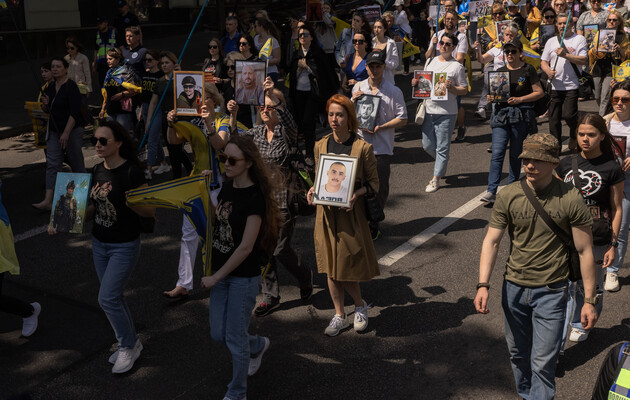
“All wars end...” is a talking point that often starts conversations in the context of the policy of appeasement of the Russian aggressor. The so-called peace plans of China, Brazil, and South Africa, the Pope’s calls for reconciliation, and Donald Trump’s statements regarding the possibility of a quick end to the Russian-Ukrainian war encourage us to analyze how Ukrainians see the prospects for relations with the aggressor country.
Is the idea of “finding middle ground” still valid? Is reconciliation between Ukraine and Russia possible? How has the attitude of Ukrainian citizens to Russian citizens changed? Ukrainians were asked about their opinions on this matter as part of a poll recently conducted by the Razumkov Center upon request of ZN.UA.
We asked Ukrainians “Is reconciliation between Ukraine and Russia possible?”. The majority of Ukrainians (68.5%) categorically reject the proposals of the “doves of peace” and believe that reconciliation between Ukraine and Russia is impossible (see Fig. 1). More than a third of them (36.3%) do not see any prospects for reconciliation, and 32.2% of Ukrainians believe that a long time must pass, so they chose the answer “No, reconciliation is impossible in the lifetime of the current generation.” Such a position of Ukrainians is predictable and completely natural. Because when a deranged neighbor runs after you with an ax and smashes everything around, it is unlikely that you will think of seeking reconciliation with him. Rather, there will be a strong desire to hit him/her with a baton.
Moreover, the youth do not want to forgive the most (see Fig. 1a). Youth is about the future – and the future of Ukraine does not want reconciliation.
However, in Ukraine, there are 21.6% of optimistic citizens, who nevertheless see the possibility of such reconciliation. Thus, 11.9% of respondents do not place responsibility for war crimes committed by the Russian authorities in Ukraine on the entire Russian people. Therefore, they believe that reconciliation is possible “...after the trial of Russian war criminals and the compensation.” 5.6% of Ukrainians believe in the great power of remorse, so they expect reconciliation “...only if Russia repents.” The percentage of those who believe that it is possible to step in the same river twice, hope that everything will return “as it used to be” and have chosen the answer option “Immediately after the end of hostilities” turned out to be even smaller (4.1% ) than the share of respondents who hesitated and chose the option “Difficult to answer” (9.9%).
Winston Churchill advised us to remember that attitude is a little thing that makes a big difference. Because thinking about something (about someone) determines our decision-making algorithm. Because attitude is, first of all, about the desire to approach something or push it away, to trust or be wary, to support or hinder. Previous polls by the Razumkov Center showed that even after the annexation of Crimea in April 2014, a relative majority (45%) of Ukrainians expressed a positive attitude towards Russian citizens, and in June 2017 – a neutral one (42.5%). In the summer of 2015, after the battles for Ilovaisk and Debaltseve, despite heavy losses, almost half of Ukrainians (47%) characterized their attitude towards the Russians as “warm.” An analysis of polls conducted by the Russian organization Levada Center over the past ten years showed that the attitude of Russians towards Ukrainians was radically different and varied from “disdainful and condescending” (“Khokhols [ethnic slur for Ukrainians] are the same Russians, but a little worse”) to “hostile” (“fascists who don’t like us”). We have to admit that for a long time the relationship between Ukrainians and Russians was rather “unrequited love” than “mutual love.”
The full-scale invasion radically changed the attitude of Ukrainians towards Russia. This is evidenced by the answers to the question “How do you feel about citizens of Russia?”. To one degree or another, 84% of Ukrainians have a negative attitude toward Russian citizens (see Fig. 2). More than a third of respondents (34.6%) believe that Russians are collectively responsible for the war with Ukraine, regardless of their political beliefs. Judging by the answers, more than a quarter of Ukrainians (26.1%) are still convinced that there are “good Russians” somewhere, so they have a negative attitude towards all Russian citizens, except for those who actively oppose the war and the Kremlin. 23.3% are not ready to change their attitude towards all Russians, so they have a negative attitude only towards those citizens of Russia who support Russia’s aggression against Ukraine.
“Only Putin and his entourage are the ones to blame for all war crimes, and the Russians are not involved,” – such a position of German Chancellor Olaf Scholz, which was over and over repeated by Russian liberals, is supported by 9.2% of Ukrainian citizens. Naturally, the question arises: where did the cemeteries of shot cars with the inscriptions “Children” come from? Who directs missiles and drones at peaceful Ukrainian cities? Who raped and destroyed? Who kidnapped Ukrainian children? It is likely that such questions also do not appear in the worldview of 1.9% of Ukrainians who, despite all the atrocities, destruction and murders committed by the Russians, continue to have a positive attitude towards all citizens of Russia without exception.
In the summer of 2022, The Washington Post published the results of a survey of Ukrainians conducted by Gradus Research regarding the family ties of Ukrainian citizens in Russia. The mentioned study showed that 48% of Ukrainian citizens have at least one relative in Russia. Most of the interviewees encouraged their Russian relatives to rethink the veracity of pro-Kremlin information and to condemn aggression against Ukraine. And although almost 40% of respondents noted that they failed to change the beliefs of their relatives, The Washington Post concluded that family ties of Ukrainian citizens can be an underestimated tool in Ukraine’s information war.
Research conducted by the Razumkov Center showed that about half of the respondents (46.6%) have relatives in the Russian Federation or the Republic of Belarus. However, 42.2% of them answered the question “How have your relations with relatives in Russia and Belarus changed?” chose the answer “We have quarreled and don’t communicate,” and almost every third (29.5%) chose the so-called ostrich strategy: “I don’t discuss it, so it doesn’t exist,” that is, the option “we communicate but avoid talking about the war and politics” (see Fig. 3). Therefore, we can say that the assumption of a respected American publication about the possibility of influencing the beliefs of Russians through family ties turned out to be wrong.
The position of 2.5% of Ukrainian citizens who chose the answer “My relatives support the actions of Russia and Belarus, and I am close to their position, therefore there are no problems between us” turned out to be quite predictable. Because such an answer correlates with the percentage of Ukrainians who “have a positive attitude towards all citizens of Russia without exception.” We have to accept the fact that there are citizens of Ukraine living among us who would gladly welcome our defeat in the war. It can also be assumed that 15.4% of respondents who noted that “relatives are on the side of Ukraine, and we are like-minded” do not support the idea of collective responsibility of Russians for the war crimes committed by the Russian authorities.
In the media space, there has emerged a relatively new phenomenon – the culture of cancellation (cancel culture, call-out culture), when a person or a group of people is condemned by communities due to violated legal, social, and ethical norms, unacceptable statements, or inappropriate behavior. As a way to drop public support, prosecute a person or change public opinion. Cultural sociologist Pascal Guillen speaks of the boycott culture as a stage of Ukraine’s decolonization. The effectiveness of the cancel culture can be measured by the indignation and grievances of Russians who supported Russia’s aggressive policy. Ukrainians have experience of a culture of boycott against Ani Lorak, Vera Brezhneva, Svitlana Loboda, and many other public figures. There are often heated discussions on social media related to cancel culture.
Ukrainians were asked “In your opinion, should Ukrainian athletes, artists, and scientists refuse to take part in competitions, contests, and events where Russians participate?”; they were offered to choose one answer to this question. 22.8% of respondents chose the option “They should refuse” – such a clear line between us and the Russian aggressor, and 16.6% suggested “... refuse if these events are organized by the Russians.” That is, 39.4% of Ukrainians fully support the boycott culture. For 13.9% of Ukrainians, a statement condemning the criminal actions of the Russian authorities is a sufficient reason to maintain contacts and cooperate with the Russians. 18.6% of respondents left the opportunity for Ukrainian participants to make a valuable choice and chose the answer “Ukrainian participants of these events must decide for themselves whether to participate in them.” Nevertheless, more respondents believe that Ukrainians should refuse to take part in competitions, contests, and events in which Russians participate (see Fig. 4).
Confusion is caused by 14.4% of respondents who believe that culture, science, and sports are outside of politics. Are they still not ready to sever mental and cultural ties with Russia, and are they, perhaps, clear, or potential bearers of hostile ideas and narratives? It can be assumed that they will again say “what’s the difference” and become an electoral target audience for latent pro-Russian parties in the renewed political landscape of Ukraine. We should face the truth and admit that rocket attacks, destroyed houses, the killing of civilians and the abduction of children have not changed the worldview and value orientations of a part of the citizens of Ukraine. Therefore, we must be vigilant and understand that after the war, we will face hard work in creating an independent state.
During more than a year of the full-scale Russian-Ukrainian war, Ukrainians have witnessed many inhumane acts committed by the Russians against the servicemen of the Ukrainian Armed Forces and the civilian population of Ukraine. In the future, experts in various subject areas will analyze whether it is the Russian way of waging war, mental and moral degradation, revenge for one's own humiliations, or envy. It is now important to find out whether the personal qualities of Ukrainians have changed in the conditions of the genocidal war.
“There are widely known videos on which the Russian military tortures, even castrates, and cuts off the heads of Ukrainian prisoners. Should the Ukrainian military respond in the same way to Russian prisoners?” the citizens of Ukraine were asked.
45.2% of respondents chose the answer “No. Torturing prisoners is a gross violation of the laws of war, and our soldiers should not commit war crimes, should not turn into sadists.” If we add 26.9% of those who answered: “I don’t know. On the one hand, these videos make me furious, on the other hand, it’s not humane,” then it turns out that 72.1% of Ukrainians prove that humanity has become our greatest manifestation of strength after all. Even in relation to an inhumane enemy. We preserved humanity in hellish conditions, when the enemy set a goal not to win, but to destroy the people. Remember this next time feeling the mood music of “treason” and “it’s gone.” We have preserved human dignity and channeled our cold rage towards a constructive area — military prowess, ingenuity, volunteer work, creativity, and humor.
6.1% of respondents chose the answer “Difficult to answer.” 7.5% of those who had certain reasons refused to answer. And although 11.7% answered: “Yes. The Ukrainian military should do the same to Russian prisoners,” everyone understands that it is one thing to say something while feeling angry, and quite another to actually torture a living being.
Humanity became a support that helped preserve personal and national identity, create horizontal connections, and believe in victory, not in “truce at any price.” Therefore, the question “Do you support direct negotiations with the Russian Federation to achieve peace?” had a negative response by the majority of Ukrainians (63.9%). 13% of respondents found it “difficult to answer” this question. Only 23.1% of respondents expressed their willingness to support direct negotiations with Russia to achieve peace (see Fig. 5).
More than a year of full-scale aggression by Russia nullified the idea of President Volodymyr Zelenskyy to “find middle ground” and quickly end the war. Ukrainians were asked: “If the question arises that in order to achieve peace it is necessary to return to the demarcation line that existed before 24.02.2022, and not to the borders of 1991, will you agree to such conditions?” – and the majority of citizens (66.8%) answered: “No, I do not agree.” Such an answer demonstrates the general resilience of Ukrainians and faith in victory. Perhaps the so-called dreaming angels, according to the apt expression of the Ukrainian writer, have finally “woken up”? Maybe while going through the “circles of hell” we remembered something about ourselves? Something “put to sleep” by enemy propaganda?
It is noteworthy that the percentage of those who agree to return to the demarcation line that existed until February 24, 2022 (17.2%) is lower than the percentage of those who are ready for direct negotiations with Russia to achieve peace (23.1%) (see Fig. 6). And the authorities will certainly have to consider such aspirations of Ukrainians.
In 2014, Anastasia Dmytruk wrote a prophetic poem Never ever can we be brothers. The Russian-Ukrainian war has not only confirmed this opinion, but also showed that we have never been brothers. And this is written in blood on the tablets of the history of our Victory.
The survey was conducted by the Razumkov Center on the order of ZN.UA from April 28 to May 3, 2023, using the face-to-face method in 22 regions of Ukraine and the city of Kyiv. 2020 respondents over the age of 18 were surveyed. The theoretical sampling error does not exceed 2.3%.
Read this article in russian and Ukrainian.
Please select it with the mouse and press Ctrl+Enter or Submit a bug












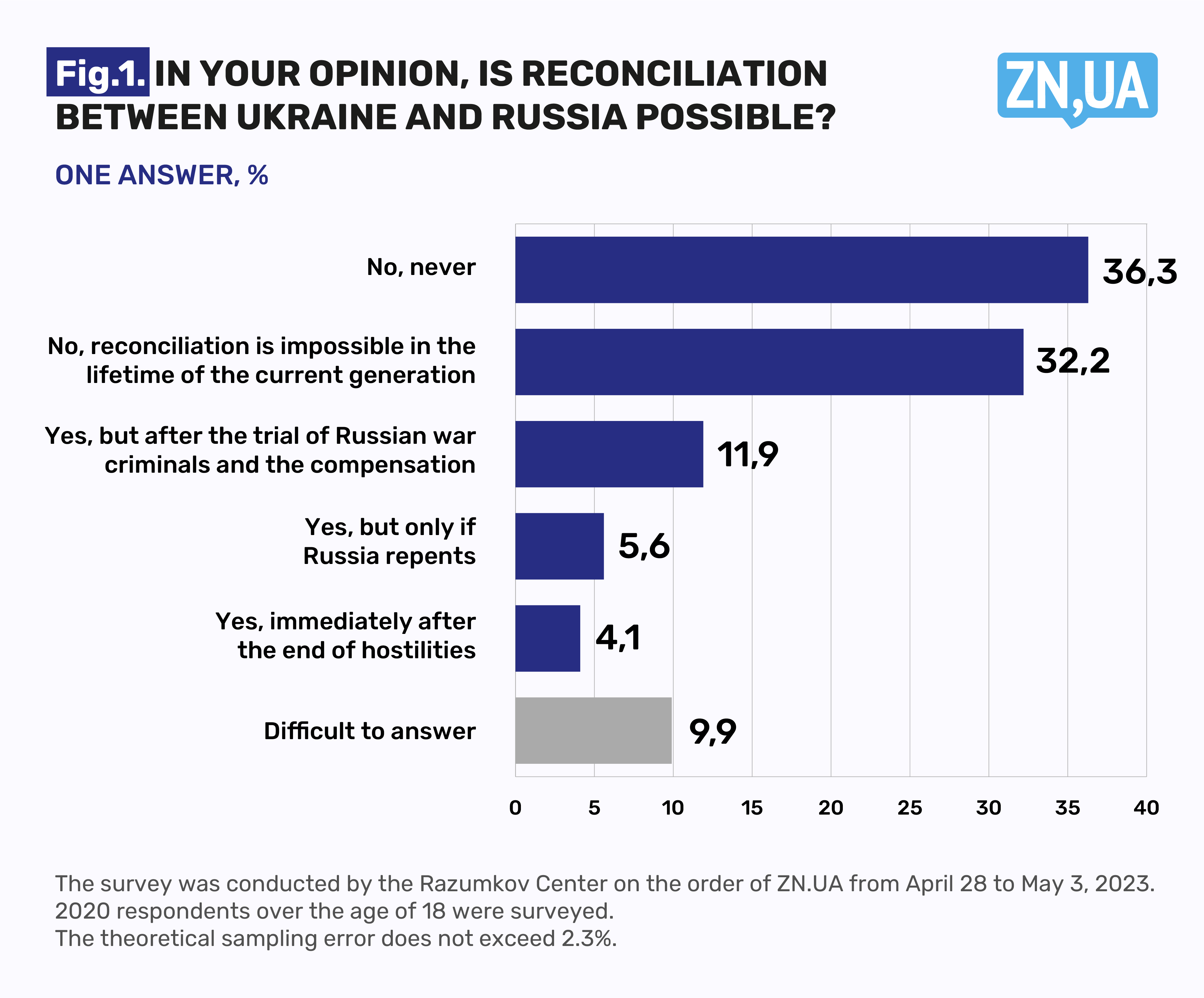
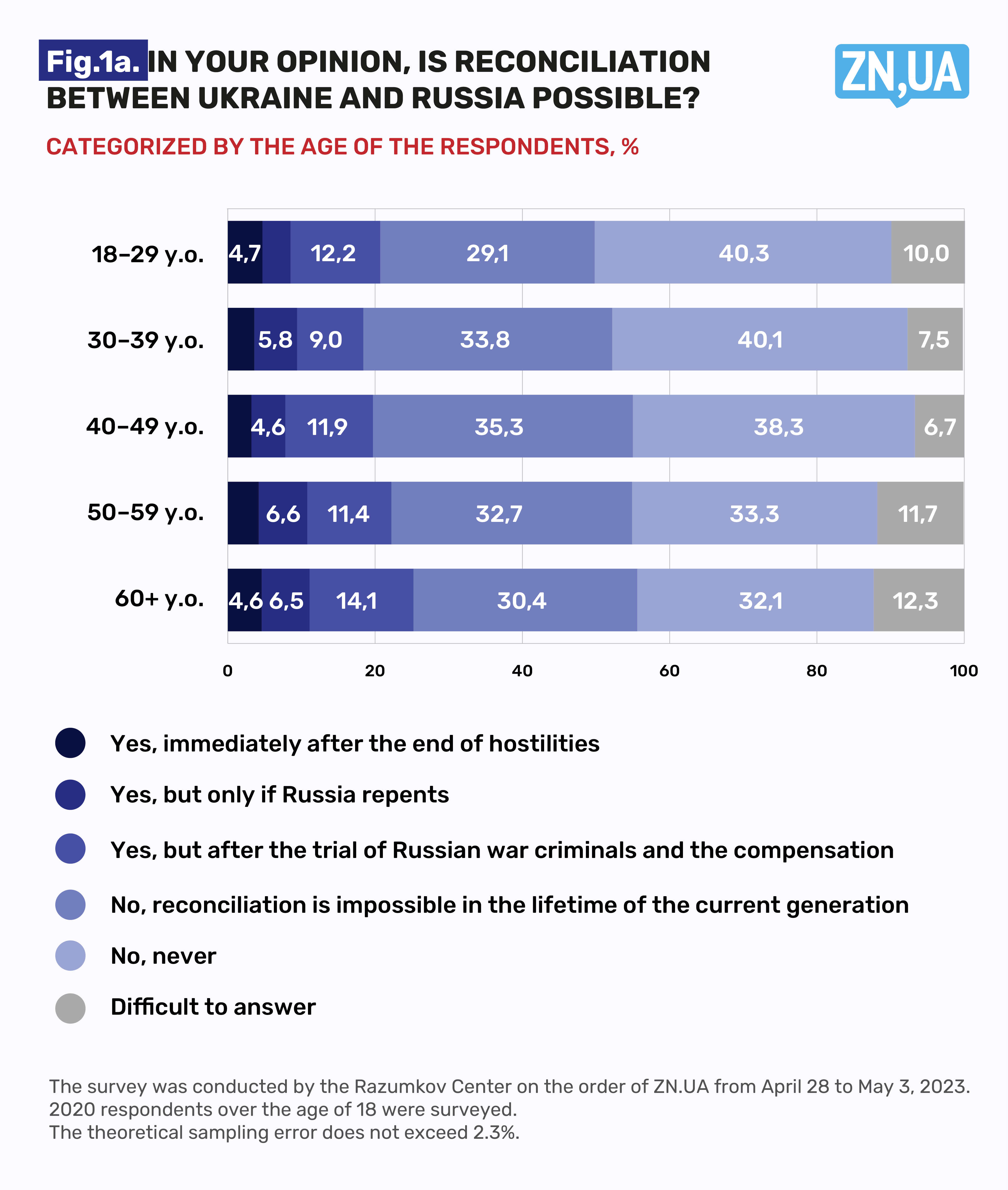
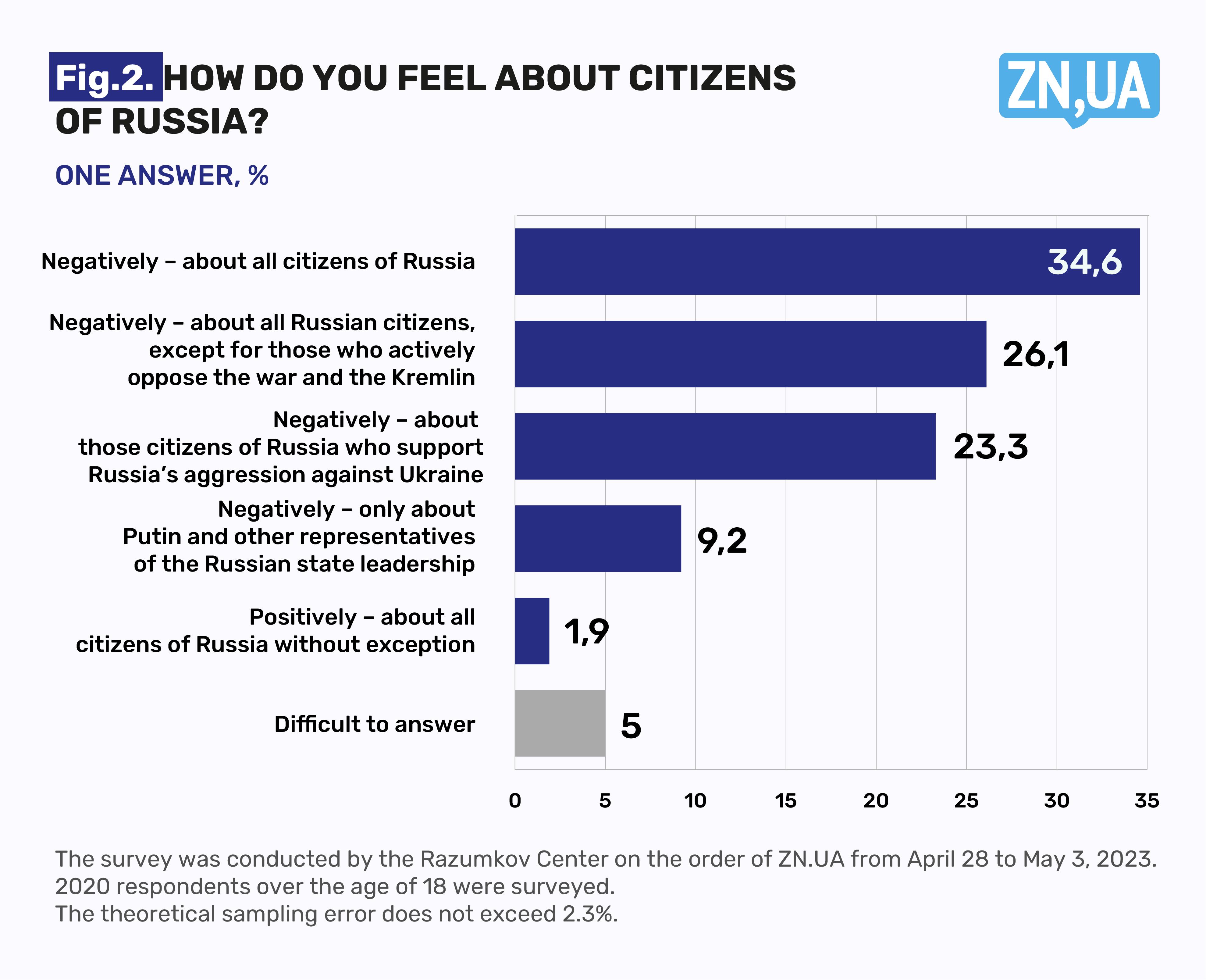
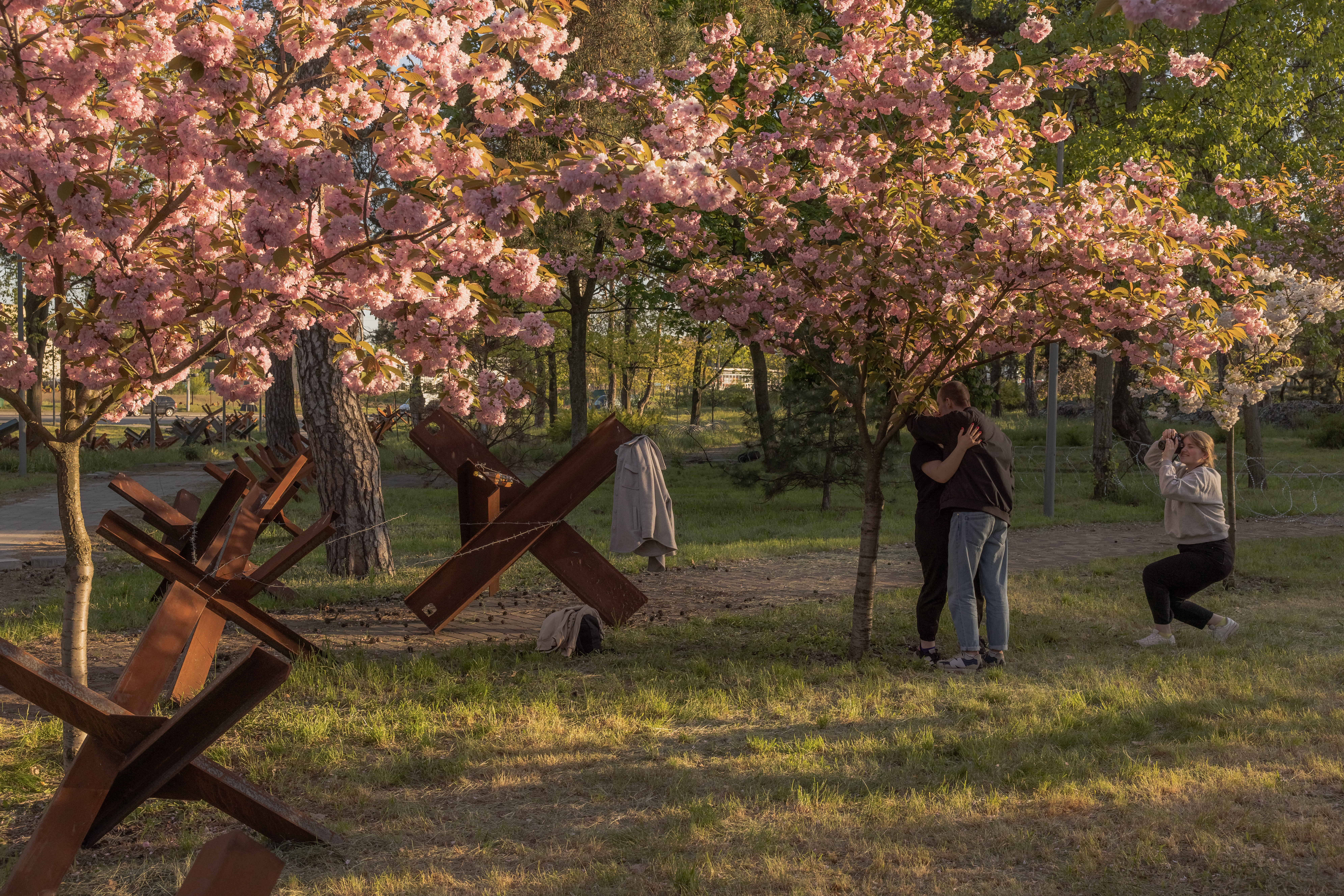
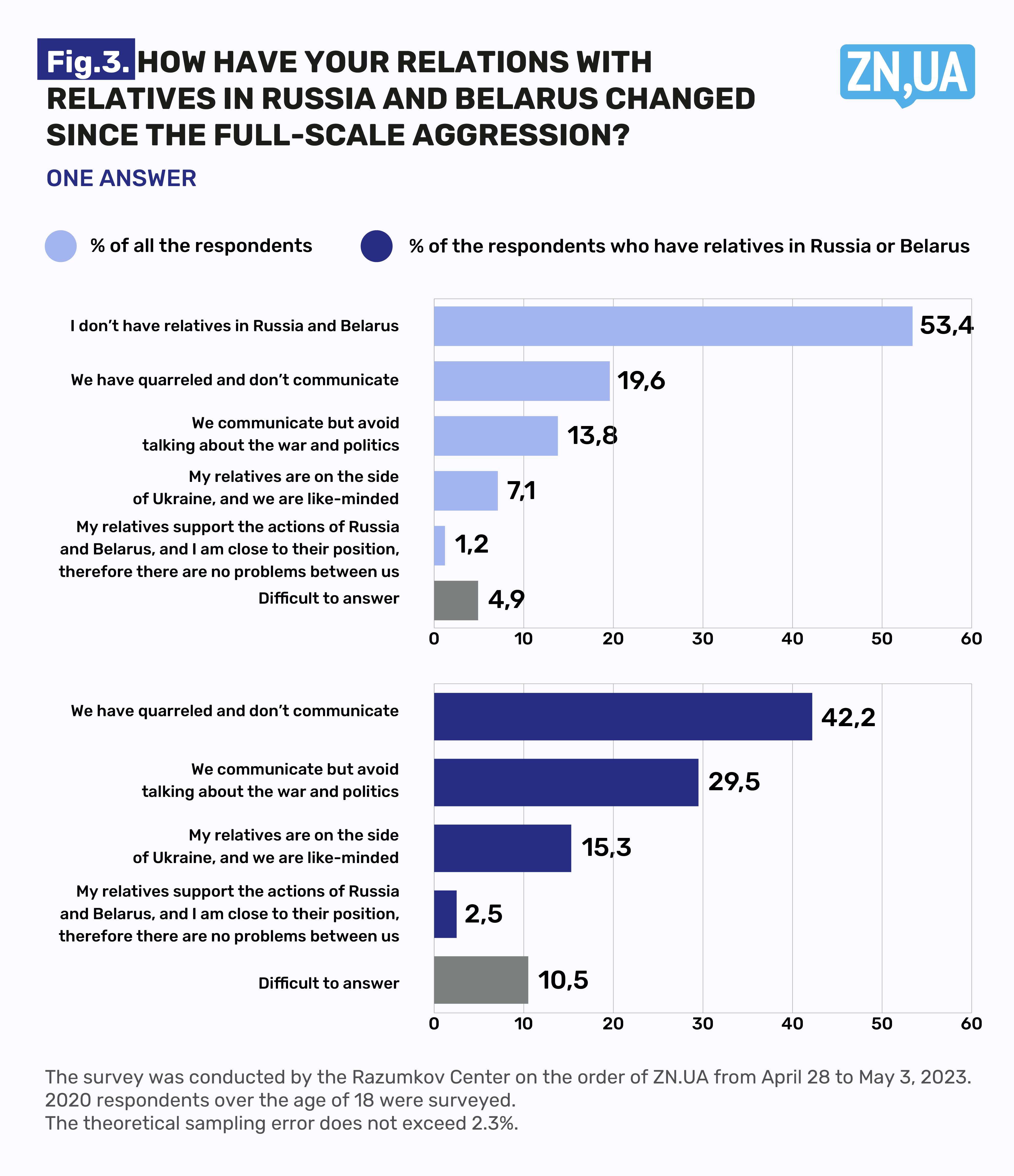
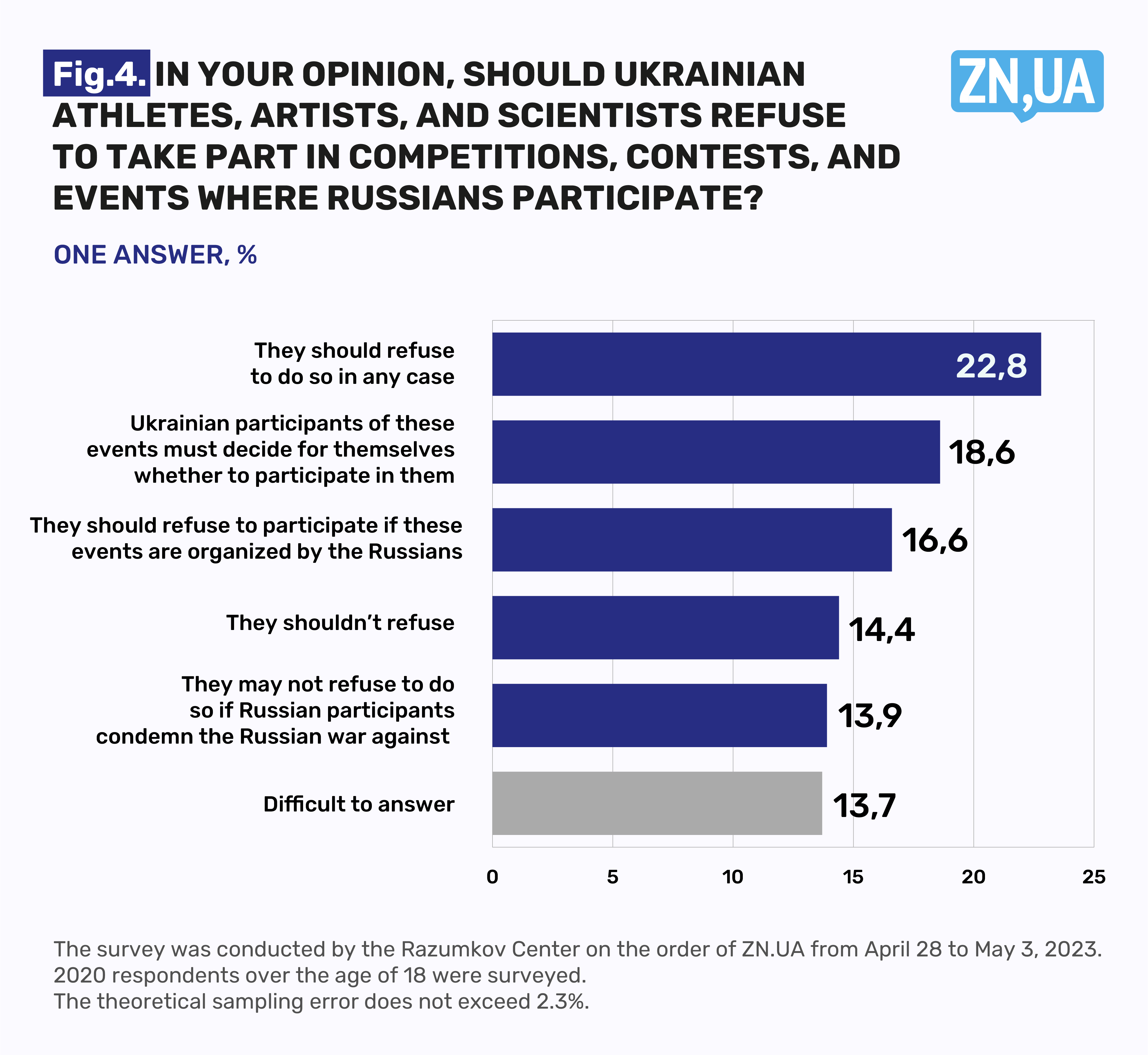
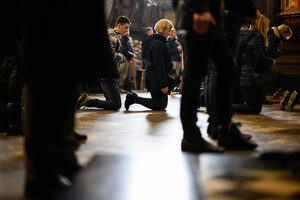
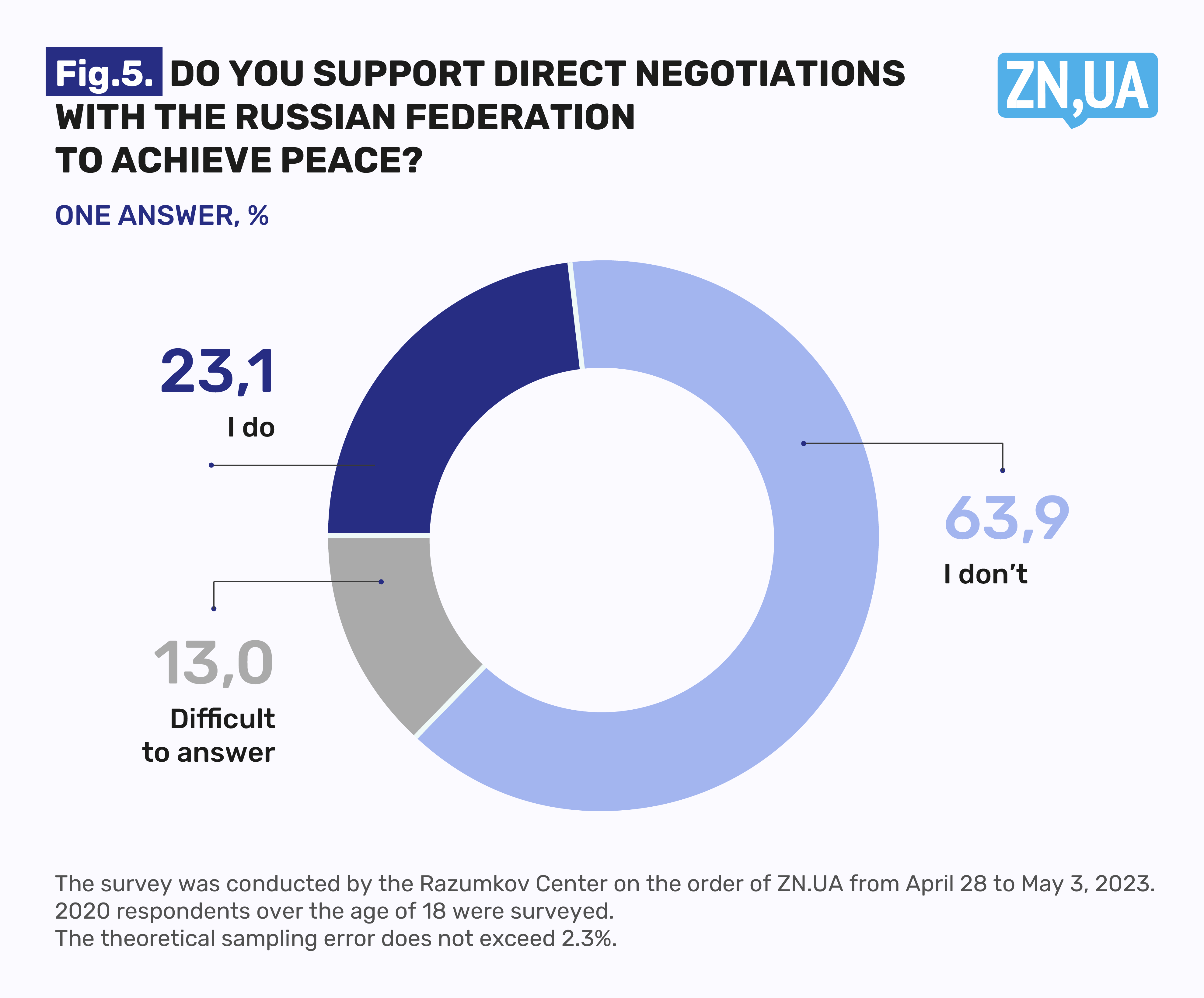
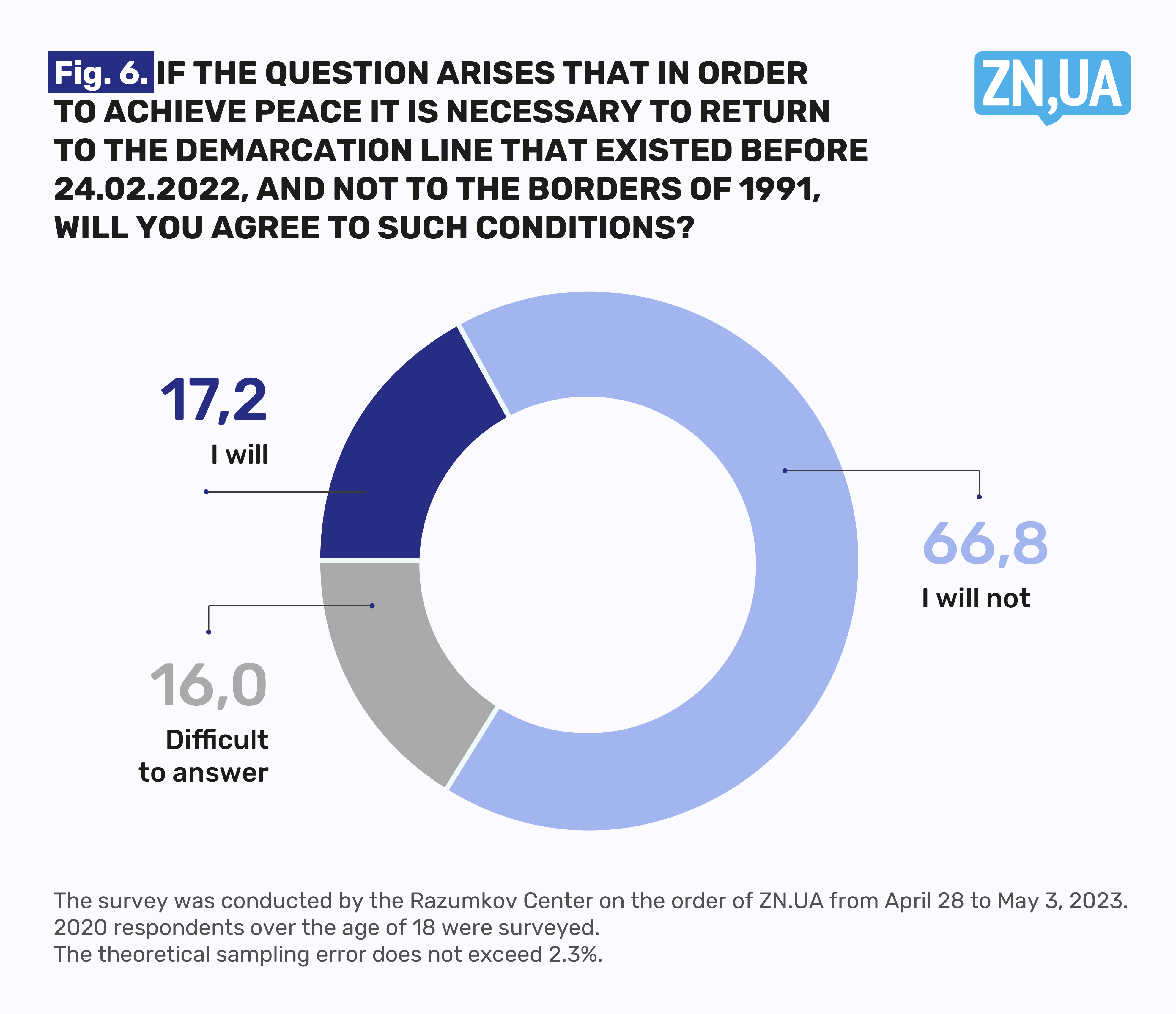
 Login with Google
Login with Google